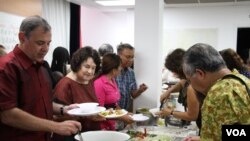The U.S. Ambassador to Cambodia has told a gathering of Cambodian-Americans that the United States should become more active in engaging with Phnom Penh as the country is undergoing a period of rapid change.
Speaking at the meeting in Maryland on Sunday, Ambassador William A. Heidt said the U.S. should not “sit on the sidelines” as developments in Cambodia brought change.
“My message to [Cambodian-Americans] is that Cambodia is changing. It is time for the United States to lean forward and to engage. This is not the time to stand on the sidelines,” he said.
“We have three or four important ways the United States can try to influence Cambodia to move in the right direction,” he added, noting the large Cambodian expatriate community living in the United States and “people-to-people” relationships as one of those methods.
“There are a lot of concerns about poverty and the political situation in Cambodia.”
During his visit, Heidt also met with Cambodian-Americans in Seattle and northern California.
Prime Minister Hun Sen’s rule has routinely come under fire from international human rights groups as corrupt and autocratic.
Sarah Kith, one attendee of the meeting, said there were many questions that needed to be answered regarding Cambodia’s future. “I’m not sure we’re at the point where we can say democracy is thriving. How do we sustain opposition? How to we encourage safe dialogue about differences and feel safe? Not only physical [safety] but also psychological? We need to be able to provide voices that are different.”
Sovan Tun, president of the Buddhikarama Pagoda, where Heidt spoke, said enduring poverty and disparities in Cambodian society were closely linked to a lack of political freedoms. “Cambodia is still poor compared to other countries. The poor are poorer. The rich are richer,” he said. “Moreover, we need to do more for freedom in Cambodia; to clamp down on oppression of the vulnerable.”
Marong Kuy, who helped run Sunday’s meeting, said Cambodian-Americans had been encouraged by the results of last month’s commune elections. “In the recent election, we can see that there could be a change in the future according to the polls as the Cambodians back there have a love for freedom and democracy.”






